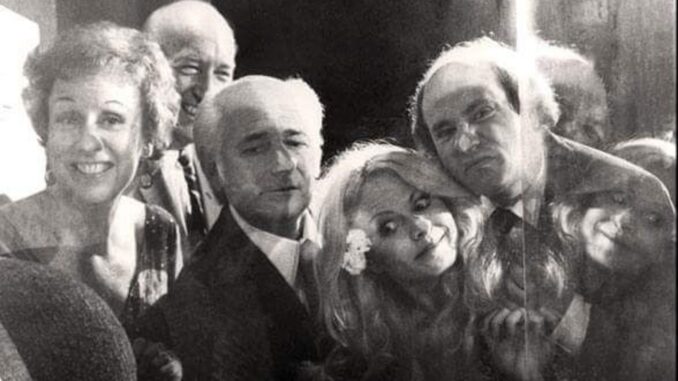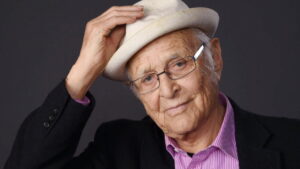
Norman Lear, who died this week at the age of 101, didn’t invent the situation comedy. But, more than anyone else, he made sure that it said something important. In 1999 he told “CBS This Morning,” “My slide rule is, if I care, you care. If I laugh, you laugh. If I think it’s serious, you’ll think it’s serious.”
Without him it’s unlikely we would have ever met Sanford and his son, Maude, the Jeffersons, the families from “Good Times” and “One Day at a Time,” or that grumpy, grandstanding daddy of them all, Archie Bunker.
He told “Sunday Morning” in 2016, “When I began to cast ‘All in the Family,’ my first thought, the only one I had in mind, that was a name I knew and a face I knew and a personality I understood, was Mickey Rooney. And he thought it was ridiculous that I was thinking of doing a show about a bigot. ‘You’re going to get killed in the streets,’ he told me. ‘They’re going to shoot you dead!'”
But Lear understood that the America of 1971 was ready for the warts-and-all realness of Archie Bunker. As he told CBS News chief medical correspondent (and his own son-in-law) Jonathan LaPook in 2021, “There’s nothing that unites people more or better than laughter.”
LaPook asked, “‘All in the Family,’ in particular, when I think about that, there were people on either side of the political spectrum who saw something in it for them.”
“I like to think what they saw was the foolishness of the human condition,” Lear said.
Finding the funny in the serious began early for Lear, when he was growing up working class in Connecticut. He was nine years old when he learned that his adored father was going to prison – sent away for three years after being convicted of selling fake bonds. Lear still remembers a neighbor’s “words of wisdom”: “Puts his hand on my shoulder and says: ‘Well, you’re the man of the house now, Norman. And uh, there there, a man doesn’t cry!’ Nine years old, I’m hearing that! Ultimately, it taught me there’s humor everywhere, in every situation.”

Lear’s worldview was also shaped by trips to New York City, looking out the train window into the apartments of Harlem. “They felt like they were eight feet away; they were probably 30 feet, they were very close,” he said. “And the windows leading into the apartments were very visible, and life inside those windows. And they were largely African-American. And I used to wonder about them. Who were these families? What were they thinking? What were their problems? I also had something in common with them. I knew by then that as a Jewish kid, there were people who hated me simply for that reason. And I understood, certainly by then, that Black people had it worse than I had it.”
Just a few years later, Lear would look out different windows a world away. During World War II, Lear served as a radio operator and gunner, flying more than 50 bombing missions over Germany and Italy. His escort during some of these dangerous flights: the famed all-Black Tuskegee Airmen.
In 2015 Lear met one of them, Professor Roscoe Brown, face-to-face for the first time. “I shot down a jet over Berlin on a mission that you were on, March 24, 1945,” said Brown.
“How amazing is it that the two of us flew the same mission, over Berlin, no less!” said Lear.
Lear understood the price of freedom, and was willing to pay real money for it. In 2000 he and internet entrepreneur David Hayden spent more than $8 million for one of 25 surviving copies of the Declaration of Independence … not for himself, but for the public. It was exhibited across the country for more than three years.
“This is an investment in sharing something that’s a part [of us], that belongs to all of us,” he said then. “The price of freedom is citizen participation, not 8.4-whatever million dollars.”
In 1981 Lear founded the progressive advocacy group People for the American Way, which ran public service announcements to spread their message. “Oh, the pleasure of being part of 250,000 people who are seeking to remind America of the tradition of religious liberty and pluralism and diversity in this country,” he told “CBS Morning News” in 1986.
Lear was not the retiring type. On most mornings, well into his nineties, he was up early, working out.
And he kept close connection with his large extended family, including his wife, Lyn, his six children, and four grandchildren.
“The soundtrack of my life has been laughter,” he said.
“And laughter, for you, is a kind of medicine, isn’t it?” asked Dr. LaPook.
“Well, I happen to believe it has everything to do with a long life.”
Norman Lear kept creating to the very end, even during the pandemic, inspiring his followers over social media, and sharing this with his daughter, Kate, and his son-in-law: “When thinking about the death, I don’t mind the going. It’s the leaving that is the problem for me! Going? Who knows what’s out there that … it can’t be all bad. But leaving? I can’t think anything good about leaving.”